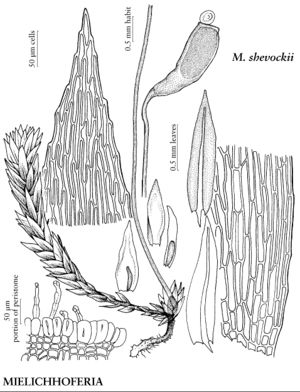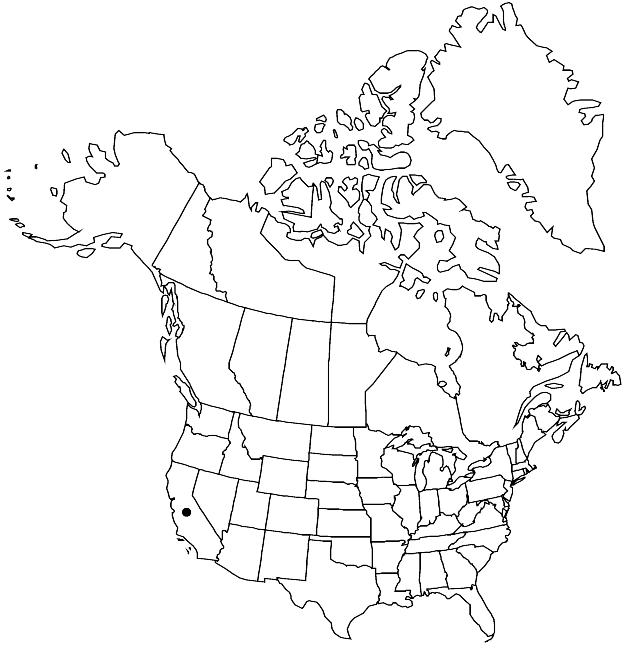Difference between revisions of "Mielichhoferia shevockii"
Bryologist 112: 605. 2009.
FNA>Volume Importer |
FNA>Volume Importer |
||
| Line 33: | Line 33: | ||
|elevation=moderate elevations | |elevation=moderate elevations | ||
|distribution=Calif. | |distribution=Calif. | ||
| − | |discussion=<p>The gametophytes of Mielichhoferia shevockii, known only from Fresno County, look much like those of genetically recombinant intermediates between M. elongata and M. mielichhoferiana derived from hybrid sporophytes but can be readily distinguished by DNA markers. The gametophytes of M. shevockii, like those intermediate between M. elongata and M. mielichhoferiana, have dull leaves that are a little more pale than is typical of pure M. mielichhoferiana, and are relatively small like those of M. elongata. Unlike those two species, M. shevockii is synoicous and has a single endostomial peristome with nearly smooth segments. In the original description of M. shevockii (as Schizymenium), the sexuality was incorrectly described as dioicous.</p> | + | |discussion=<p>The gametophytes of <i>Mielichhoferia shevockii</i>, known only from Fresno County, look much like those of genetically recombinant intermediates between <i>M. elongata</i> and <i>M. mielichhoferiana</i> derived from hybrid sporophytes but can be readily distinguished by DNA markers. The gametophytes of <i>M. shevockii</i>, like those intermediate between <i>M. elongata</i> and <i>M. mielichhoferiana</i>, have dull leaves that are a little more pale than is typical of pure <i>M. mielichhoferiana</i>, and are relatively small like those of <i>M. elongata</i>. Unlike those two species, <i>M. shevockii</i> is synoicous and has a single endostomial peristome with nearly smooth segments. In the original description of <i>M. shevockii</i> (as Schizymenium), the sexuality was incorrectly described as dioicous.</p> |
|tables= | |tables= | ||
|references= | |references= | ||
| Line 57: | Line 57: | ||
|publication year=2009 | |publication year=2009 | ||
|special status=Endemic;Selected by author to be illustrated | |special status=Endemic;Selected by author to be illustrated | ||
| − | |source xml=https://jpend@bitbucket.org/aafc-mbb/fna-data-curation.git/src/ | + | |source xml=https://jpend@bitbucket.org/aafc-mbb/fna-data-curation.git/src/8f726806613d60c220dc4493de13607dd3150896/coarse_grained_fna_xml/V28/V28_308.xml |
|genus=Mielichhoferia | |genus=Mielichhoferia | ||
|species=Mielichhoferia shevockii | |species=Mielichhoferia shevockii | ||
Revision as of 18:04, 18 September 2019
Plants medium-sized, green, dull. Leaves erect to ± spreading, 0.8–1.3 mm; distal medial laminal cells hexagonal to rhomboidal, 60–110 µm, walls moderately thick. Specialized asexual reproduction absent. Sexual condition synoicous. Capsule erect or inclined to 30°; peristome single; exostome absent; endostome basal membrane scarcely exceeding capsule rim, segments short, irregular, slightly keeled, not perforate. Spores 15–20 µm, finely roughened.
Phenology: Capsules mature spring (Apr–Jun).
Habitat: Soil, rock
Elevation: moderate elevations
Discussion
The gametophytes of Mielichhoferia shevockii, known only from Fresno County, look much like those of genetically recombinant intermediates between M. elongata and M. mielichhoferiana derived from hybrid sporophytes but can be readily distinguished by DNA markers. The gametophytes of M. shevockii, like those intermediate between M. elongata and M. mielichhoferiana, have dull leaves that are a little more pale than is typical of pure M. mielichhoferiana, and are relatively small like those of M. elongata. Unlike those two species, M. shevockii is synoicous and has a single endostomial peristome with nearly smooth segments. In the original description of M. shevockii (as Schizymenium), the sexuality was incorrectly described as dioicous.
Selected References
None.

